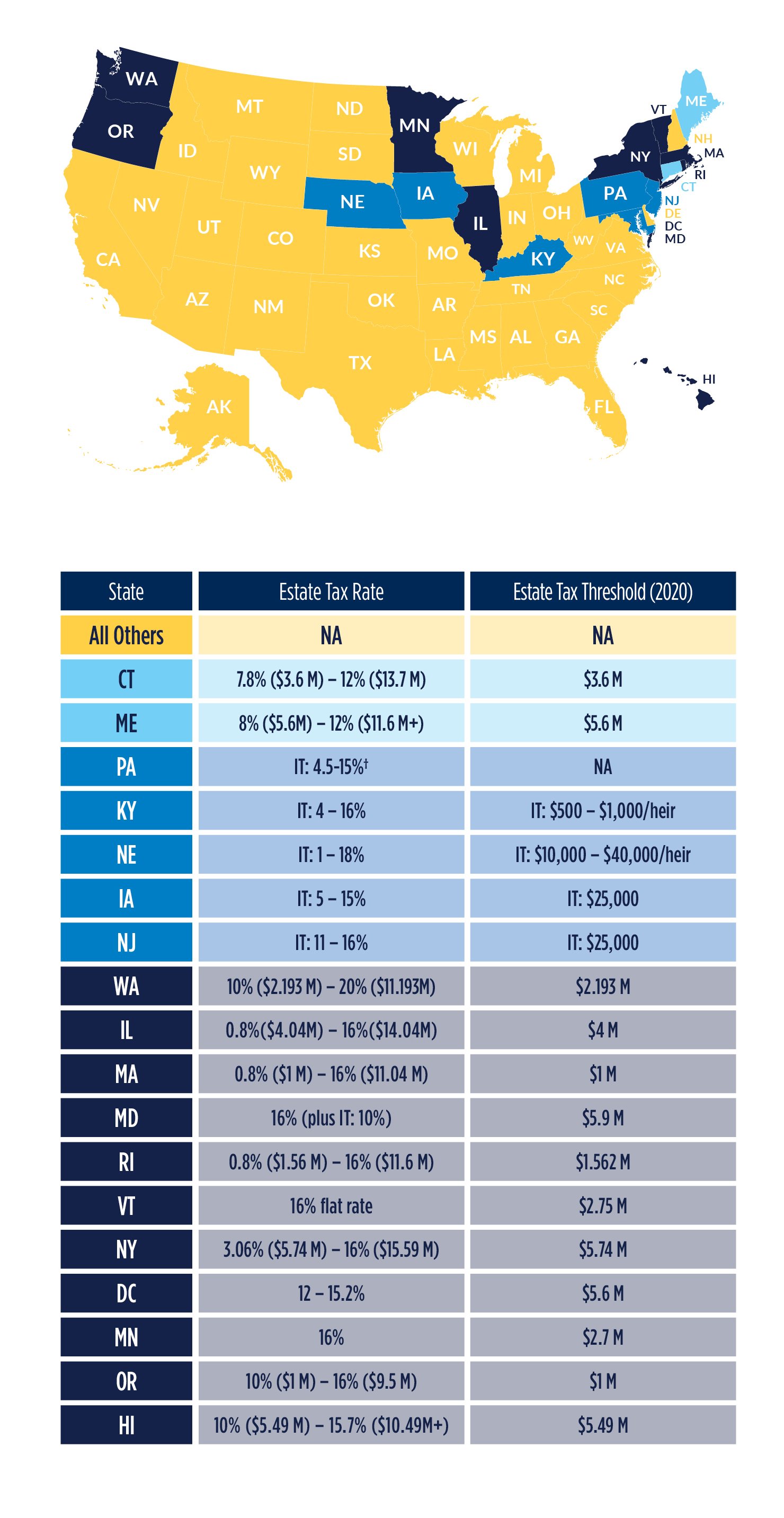Tax Savings, Will, Elder Care, Estate taxes, executor help
Five Common Mistakes Made by Executors & How to Avoid Them

Administering a trust or an estate is an important responsibility. In addition to keeping track of all relevant assets, income and expenses, executors must attend to the interests of the beneficiaries while often undergoing the grieving process themselves. Here are five common mistakes to avoid:
1. Failure to Consider Carrying Costs
Carrying costs can quickly accumulate and eat away at the value of an estate, so when it comes to the estate settlement process, time is money. The executor should ensure that ongoing costs such as property taxes, insurance and lawn care or snow removal are met, while acting decisively to liquidate assets that cost the estate money.
Other costs may include making necessary repairs and reviewing insurance coverage for a vacant home. It is recommended that the executor organizes the sale or transfer of the home as soon as is practicable.
2. Failure to Consider Opportunity Costs
Just as the value of a decedent’s residence is subject to carrying costs, there are opportunity costs to leaving assets in an estate as well. Inflation will inevitably diminish the value of assets held in an estate. Also, some assets may be subject to unexpected losses and could be put to better use in other investments or be used to pay down debt and thereby reduce interest payments and fees. Over time, these opportunity costs can reduce a person’s legacy by 10 percent per year or more. A prudent executor will work quickly to gather and distribute all assets from the estate as soon as is legally permissible, giving the beneficiaries the opportunity to use or grow their inheritance.
3. Sentimentality and Slow Decision Making
As the executor of a loved one’s estate you will need to process your own grief while also making practical decisions. It may be helpful to think of your role as an executor as a professional responsibility, separate from your obligation to the decedent as a family member or friend. This will give you the distance to make business-like decisions for the estate, and not sink into sentimentality. The decedent trusted you to be organized, diligent and professional in carrying out their final wishes in a prudent and expeditious fashion. If the decedent was a loved one, it may be beneficial – even healing – for you and other beneficiaries to spend some time examining their possessions and revisiting memories. Beware, though, of getting lost in minutiae as it can quickly increase your costs while not significantly increasing your inheritance.
4. Not Hiring Professional Help
Many individuals adopt a “do it yourself” approach to administering an estate instead of hiring professionals, such as accountants, appraisers, lawyers and contractors. What many people don’t realize is that by “DIY-ing” it, the savings to any one beneficiary is low, but the liability for the executor can be extremely high. If you or another non-professional unknowingly violate building codes, miss deadlines, or simply fail to acquire necessary licenses or permits, beneficiaries may seek to impose liability. In addition, a good accountant and attorney are well worth their fees for what they may save you in taxes and time.
5. Ignoring the Calendar
Be sure to keep track of tax filing dates, real estate cycles, and seasonal costs. For most clients, filing estate and trust income tax returns on a calendar year (vs. fiscal year) basis makes the most sense. As a result, you will want to keep an eye on the calendar so that you can reduce the number of years required for filing returns. Imagine a client who passed away late in the year: most likely, it will be impossible to close out his or her estate in a few months, and therefore tax returns may be required for two years at least.
Real estate cycles are also important to keep in mind regarding the sale of the decedent’s home, which is often their largest asset. Allow appropriate time to clear out a residence, make needed repairs, and hire professional cleaners to present the property in a good light, but do not embark on a program of major capital improvements. Realtors say that March, April and May are the best months to list a home, while November and December are the worst. In addition to putting a home on the market when it has the best chance of selling for a high price, it is important to think about allowing yourself enough time between the sale and the applicable filing deadlines to file all necessary paperwork and tax returns.
Summing Up
As you can see, an executor is trusted with dozens of projects, many of which interrelate. Getting stuck at any one stage can lead to delays and disruptions which over time compound and can create enormous opportunity costs which in turn can result in liability to the executor or trustee. Navigating the winding path between decisive action and careful consideration can prove tricky without the guidance of a seasoned professional. At Donohue, O’Connell & Riley, our attorneys have “seen this movie before” and even though this might be your first time serving as an executor or trustee, it is definitely not ours. Our attorneys have collectively spent over 100 years administering trusts and estates and can guide you along the long road to the conclusion of the estate administration process, while providing an independent perspective at one degree of removal from the difficult emotional circumstances that you will be handling.
January 7, 2022
News, Tax Savings, Tax Exemption, Estate taxes
Retirement Landscape: Estate Taxes

The quality of your retirement can be impacted by state-level taxes, such as income, sales and property taxes. Taxes tend to lead to inflation, meaning the cost of living trends higher in high tax states. Your spending power will thus be greater in states with low state taxes. Retiring in a state with high taxes, such as California where income taxes alone range up to 13%, means paying a large chunk of your retirement income to the state, diminishing your spending power. Consider how you plan to spend during retirement; do you prefer to make your home a vacation destination for others, or do you want to be the one travelling? If the latter, putting down roots in a small home in a state with low taxes may give you the financial freedom you want to see the country or the world.
Still another factor to consider is the taxes payable upon death, commonly called estate taxes or inheritance taxes. An estate tax is based on the value of the decedent’s gross estate (all the real and personal property the decedent owned); whereas an inheritance tax is based on the relationship between the decedent and the beneficiary. The chart on the right identifies the states with a state-level death tax. Estate taxes are highest in Washington, which currently has a 20% estate tax on estates over $11.2 million. Other tough tax jurisdictions include Vermont, New York, Massachusetts, Rhode Island, Maryland, Oregon and Hawaii. Retirees who have family in these states may benefit from maintaining a primary residence in a low tax state, with a second home in the higher tax state.
Six states have an inheritance tax: New Jersey, Pennsylvania, Maryland, Kentucky, Nebraska and Iowa. Although bequests to spouses are exempt from inheritance tax, bequests to children, siblings, nieces and nephews, cousins, or close friends may bear a high tax. Crossing the border to a state without an inheritance tax can save your loved ones hundreds of thousands of dollars. For example, a niece who inherits from an aunt who passes away in New Jersey with a $5 million estate will pay approximately $750,000 to the State of New Jersey; however, if the same aunt died a New York resident, there would be no inheritance tax liability.
Another way to take advantage of tax-friendly jurisdictions is by establishing a trust in that state. In New Hampshire, trusts are exempt from state-level income, sales and estate taxes. Consider again a woman living in New York or New Jersey with a $7 million estate. If she were to transfer her investments to a New Hampshire trust, her niece could inherit from the trust without having to pay estate or inheritance tax. Often people find that the tax savings they enjoy by establishing a New Hampshire trust more than pay for the costs and fees associated with setting up and maintaining the trust. Each individual’s circumstances are different. Working with your investment advisor and accountant, our attorneys can create a custom estate plan that will maximize your spending power in retirement and help you navigate your own retirement map.

January 18, 2021
News, Tax Savings, Tax Exemption
ACT BEFORE YEAR-END TO PRESERVE YOUR CURRENT ESTATE TAX EXEMPTION

Strategies to Reduce Gift/Estate Tax Uncertainty
Many of our clients have had their eyes on the election and may be rightly thinking about the need to update their gift and estate planning. There is already an open discussion about a rollback of the 2018 Trump tax cuts in the Biden camp. If Biden’s win is confirmed, and if those sympathetic to Biden’s policy proposals gain control of both houses of Congress, the current generous gift tax of exemption $11.58M, or $23.16M for a married couple, could easily be reduced by 50% or more. Currently, the balance of power will be decided by a run-off election for Georgia’s two senate seats, which won’t be decided until January 5th, potentially too late to make a decisive move.
To counter this uncertainty, consider a strategy that allows you to “freeze” the current generous gift estate exemption: the gift of a promissory note. An individual can promise to make gifts to donees in the future through such a gift. This promise to make the transfer in the future allows the donor/promisor to take advantage of the current $11.58M estate tax exemption, while still having possession and control of the funds or property.
Normally, a promise must be supported by some consideration and show mutual assent by the parties to be enforceable. Nevertheless, for gift tax purposes, a transfer may constitute a gift even if the property is transferred for less than adequate and full consideration in money or money’s worth. 26 U.S. Code §2512. Additionally, a gratuitous transfer of a legally binding promissory note is considered a completed gift even though the donor is solely making a promise to gift property in the future. Rev. Rul. 84-25. These gifts should be timely reported on a Form 709: “United States Gift (and Generation-Skipping Transfer) Tax Return.”
Whether this gift strategy will ultimately reduce the estate tax burden will depend in part on whether the taxpayer dies within 3 years of making the gift. If so, the IRS can successfully “add back” the tax burden to the decedent’s gross estate. Gifts made shortly prior to a person’s death are normally considered “gifts in contemplation of death”; in other words, a gift of property made by a person expecting to die soon. If the gift is considered to be made in contemplation of death, the gift will be included in the value of the decedent’s estate for federal tax purposes, which could result in taxation if the estate tax threshold is lowered significantly.
A potential solution to this issue may be a self-cancelling note. This instrument works similarly to a typical installment note, in that payments are made to a person or a trust periodically over a specified period of years. But, unlike a classic installment note, a self-cancelling note includes one or more provisions for automatic cancellation of the unpaid balance at the death of the seller/donor. Therefore, if the donor dies before the specified period, the property is transferred, and the value is removed from the decedent’s estate. If the donor lives beyond the period over which payments may be made, the “cancel at death” provision(s) are not triggered.
Some states have similar provisions to the federal 3-year-period explained above. One example is the State of New York, where there is no gift tax. Here, New York Tax Law § 954 (a) (3) includes in a New York resident’s taxable estate the amount of any gift made during the three year period before the decedent’s death, but not including any gift made: (a) by a non-resident of New York state; or (b) before April 1st, 2014; or (c) between January 1st, 2019 and January 15th, 2019; or (d) that is real or tangible personal property having an actual situs outside NY state at the time the gift was made. This provision is set to expire on January 1st, 2026, in line with current Federal law.
Another strategy is to make the promissory note payable to an irrevocable trust for the benefit of the donees. In this case, the donor could promise to pay or give property to a trust for the donee’s benefit. The note would then be delivered to and enforceable by the trustee of the trust. Even though the beneficiaries of the trust are the ultimate recipients, they should not be considered to have received an indirect gift to the trust for gift tax purposes. If the note is payable to a trust created by the donor, the trust could be structured as a grantor trust for income tax purposes. 26 CFR §1.671-2 (e) (2). Consequently, neither the donor nor the trust should be taxed on the interest on the note. Rev. Rul. 85-13.
Carefully implemented, this gift tax strategy can allow you to benefit from the current gift tax exemption, without losing control of assets, and may allow you to reduce your estate tax burden significantly. Contact us to see if this simple but effective strategy could be right for you.
November 16, 2020
How to Take Care of Your Pot of Gold

Like any mischievous Leprechaun, we all want to hang onto our hard-earned pots of gold. Here at Donohue, O'Connell & Riley, we treat the tax season with just as much vigilance. As our names suggest, the Irish blood runs deep, and we're not about to let anyone whisk away your wealth — especially not some pesky little green man or the old guy with long white hair and whiskers!
So, to celebrate St. Patrick's Day, here are three tax traps that a properly structured trust can help you avoid:
- State Income Tax
Forty-three states impose some form of income tax. In the Northeast, the top state income tax rates range from 3.07% in Pennsylvania to 12.7% in New York City. But certain jurisdictions exempt trusts from state-level income tax. New Hampshire trusts are exempt from all state-level income tax: capital gains, interest and dividends are not taxed while assets remain in the trust.
- State-Level Estate, Inheritance and Gift Tax
The majority of Northeast states impose a state-level estate tax on assets that exceed a certain threshold. Also, Connecticut has a gift tax and in New Jersey and Pennsylvania estates may be subject to inheritance taxes. New Hampshire is the only state in the Northeast without a state-level estate, gift or inheritance tax, meaning that your wealth will not face state-level penalties as it transfers to the next generation.
- Federal Estate Tax
The 2017 Tax Cuts and Jobs Act doubled the federal estate and gift tax exemption, and further adjustments for inflation mean that in 2020 a married couple will not pay federal estate taxes on assets less than $23.16 million (the exemption threshold is $11.58 million for individuals). You can leverage this opportunity to fund a New Hampshire-based trust. In addition, assets held in New Hampshire "dynasty" trusts minimize taxes paid on amounts transferred to the next generation. This allows trusts to continue in perpetuity, saving families significant expenses as well as time in court. With this provision "sunsetting" in 2026, now is the time to leverage this law's ability to fund a New Hampshire-based trust.
So if you have a pot of gold that you want to preserve as your legacy, contact us today, (Toll Free)1.844.50.TRUST or info@docrlaw.com.
“Lá Fhéile Pádraig sona duit!” ("Happy St. Patrick's Day!")
March 17, 2020
Tax Saving, Trust, Tax Savings, Asset Protection, Will, Revocable Trust, Irrevocable Trust
The Advantages and disadvantages of a Will, a Revocable Trust, and an Irrevocable Trust

There are a host of complicated terms associated with the legal practice of estate planning, but the Donohue, O’Connell & Riley team prides itself on making the process as simple for our clients as we can. Download our free comparison chart to learn if a Will, Revocable Trust or an Irrevocable Trust is best for you here.
February 26, 2019


